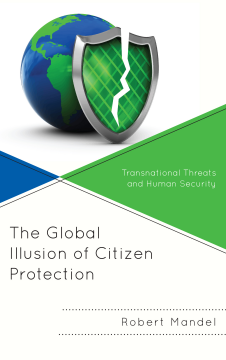
Additional Information
Book Details
Abstract
This book comprehensively analyzes the global illusion of citizen protection so common today. This text helps students understand a central puzzle in human security, which has two distinct components: (1) although it might be reasonable to assume that political leaders’ threat responses would almost always have a decent chance of safeguarding the mass public, sometimes they do not, exhibiting rhetoric-reality gaps and purely symbolic gestures; and (2) although the wealth of security information available to the mass public would seem to provide them with the opportunity to gain almost always an accurate picture of existing dangers and state threat responses, sometimes citizens’ evaluation of their own safety is grossly distorted, exhibiting an overly extreme sense of helplessness about ongoing threat and an overly extreme sense of skepticism about state protection.
At first glance, it is difficult to comprehend fully why states would often select ineffective means of protecting their citizens (assuming the availability of other options) when it appears that there are incentives for them to choose effective ones, particularly within societies with responsive forms of government; and why citizens would often mischaracterize their own security predicament when they have a direct “on-the-ground” view of their plight and seem to have incentives to view their own safety accurately.
In exploring these puzzles through detailed international case study analysis, this text investigation consciously deviates from some prevailing orthodox assumptions. It call into question the desirability of the political centrality of state authority and of the prevailing economic and cultural norms in today’s world, opening up serious questions about when and how existing structures and values contribute to increasing rather than decreasing human insecurity for the average world citizen.
Robert Mandel has written a thought-provoking and highly topical study of some of the most important security questions of our time. Revisiting the tensions between the transnational and national, he points to the difficulties of substantially protecting citizens but also discusses proper responses to increase trust between state and society.
Magnus Christiansson, Stockholm University, Swedish Defence University
Robert Mandel is Professor of International Affairs, Lewis & Clark College (he has published 13 books and over 40 articles and book chapters on conflict and security issues, testified before the United States Congress and worked for several American intelligence agencies).
Table of Contents
| Section Title | Page | Action | Price |
|---|---|---|---|
| Contents | vi | ||
| List of Figures and Tables | viii | ||
| Acknowledgments | x | ||
| Introduction | xii | ||
| Chapter One: The Current Global Human Security Predicament | xxii | ||
| Chapter Two: Paradoxes Surrounding State Protection of Citizens | 18 | ||
| Chapter Three: Futile Fear-Based State Threat Responses | 29 | ||
| Chapter Four: Distorted Fear-Based Citizen Safety Images | 42 | ||
| Chapter Five: Global Case Studies about the Illusion of Citizen Protection | 60 | ||
| Chapter Six: Case Analysis and Emerging Patterns | 190 | ||
| Chapter Seven: Obstacles to Reducing Citizen Insecurity | 214 | ||
| Chapter Eight: Enhancing Genuine Citizen Protection | 227 | ||
| Conclusion | 241 | ||
| Index | 256 | ||
| About the Author | 266 |
